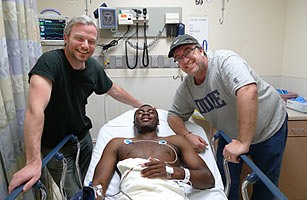
E. Benjamin Skinner, left, and Miles Wright smile for the camera after their friend Bill Nathan regained consciousness at Broward General Medical Center in Fort Lauderdale, Fla.
I was in Haiti in October 2005 researching my book on modern-day slavery when I contracted a severe case of malaria. A young Haitian man named Bill Nathan, then 21, who manages a shelter for homeless boys in Port-au-Prince, took me in and attended to me daily as I lapsed in and out of consciousness. He found the chloroquine that kept me alive.
When the epic earthquake struck Port-au-Prince on Jan. 12, 2010, I saw a chance to repay the debt.
At 4:51 p.m. that day, Bill was on the seventh-floor garden on the roof of the Maison St. Joseph, a sanctuary of peace for some 20 boys who were either abandoned by their families or were child slaves, like Bill had once been. He had just ushered five of the boys down to their chores on the ground floor so that he could enjoy his one daily indulgence: a few moments of solitude in the garden's little gazebo, which was surrounded by potted plants, before the evening prayers.
Two minutes later, the quake smashed open the building, and the top three floors pitched northward, hurling Bill down nearly 80 feet onto a neighbor's concrete roof, where he landed briefly, apparently on his back. Almost immediately, he tumbled onto a tin-roofed shack and then to the ground. A neighbor later said she saw Bill "flying like a bird." In his last moments of consciousness, Bill saw the top three concrete floors of the orphanage, along with a massive wind charger, hurtling toward him. Instinctively, he rolled out of the way and grabbed a clothesline, pulling himself into a corner before the cement crashed exactly where he had fallen. His legs wouldn't work, so he crawled for several feet over broken glass before passing out.
The first three floors of the house, where all but one of the boys were gathered, shook "like a scene out of Titanic," said house founder Michael Geilenfeld, but miraculously, they did not collapse. Had the quake hit 15 minutes later, all of the boys would have been on the sixth floor. Tragically, a 25-year-old American seminary student was crushed on the fourth floor.
Forty-five minutes passed before the others in the house discovered Bill, who was unconscious but alive. The older boys carried him on a table to Kez Furth, 24, a volunteer American nurse living next door. For the next four days, Furth treated Bill on the floor of her 500-sq.-ft. clinic-apartment, outfitted with less than that of the average public-school nurse. At the same time, she attended to dozens of other victims, who convened in a refugee camp up the block. Some had traveled up to a mile for treatment.
When news of the quake reached me, I immediately called Bill's cell phone, to no response. On the morning of Jan. 13, I reached out to Miles Wright, the no-nonsense, burly Texan who serves as treasurer of Hearts With Haiti, the group under whose umbrella Maison St. Joseph and two other similar facilities run. Over the next 48 hours, we heard sporadic reports that Bill had regained the ability to sit up, then to walk gingerly, but that overall his condition was worsening. Miles resolved to act: "Round where I'm from, when your family's in trouble, you show up." On the night of Jan. 14, we convened in Fort Lauderdale, Fla. Through the extraordinary support of Hollywood director Tom Shadyac, a friend of Bill's and mine, we were able to hire a small twin-engine plane. Although that morning the FAA had ordered a ground stop on all flights bound to Haiti, I worked the phones, and by Jan. 15, we were packing the six-seater with two Haitian surgeons and some 200 lb. of medical supplies and baby formula.
After dark that day, the U.S. military finally cleared us to land in Port-au-Prince, and we drove into the city past clusters of Haitians who stood in defiance of the destruction around them, praying and singing in impromptu street concerts. The orphanage lay half-shattered. Concrete chunks hovered precariously over surviving structures, suspended only by rusty rebar. Maison St. Joseph had been looted of its store of rice and beans. When Geilenfeld hired a neighbor to carry some of the remaining food to a more secure location, a desperate crowd by the Caribbean Market mobbed the neighbor, beat him and stole the provisions.